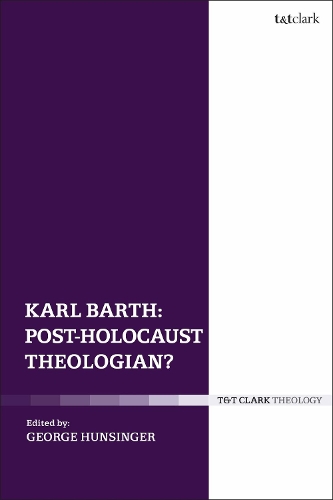
Karl Barth: Post-Holocaust Theologian
(Paperback)
Available Formats
Publishing Details
Karl Barth: Post-Holocaust Theologian
By (Author) George Hunsinger
Bloomsbury Publishing PLC
T.& T.Clark Ltd
22nd August 2019
United Kingdom
Classifications
Tertiary Education
Non Fiction
Christianity
230.044092
Physical Properties
Paperback
184
Width 156mm, Height 234mm
268g
Description
Karl Barth's attitude toward the Jews, despite some admittedly unfortunate elements, still has much to commend it and the essays in this volume discuss this matter. The contributors examine numerous topics: the extent to which Barth compares favorably with recent post-Holocaust theologies, Barths position on the Jews during the Third Reich, his critique of the German-Christian Vlkish church on ethical grounds. The discussion tackles Barth dialectical Yes to Israels christological No, it unpacks his ground-breaking exegesis of Rom. 9-11; as well as examines Barths rejection of the 1933 Aryan Law that formed the basis for excluding baptized Jews from Christian communities during the Third Reich. The essays also examine Barths later worries about Nostra Aetate, Vatican IIs landmark Declaration on the Relation of the Church to Non-christian Religions. This is followed by an in-depth explanation how Barths theology differentiated the question of religious pluralism from churchs relationship with Judaism. This inspiring volume concludes by taking up the neglected question of Barths place in modern European history.
Reviews
It is clear that [this] volume offer[s] a great service to both the world of interfaith dialogue and to Barth scholarship exceptionally rich and multifaceted resources of historical and theological insight, providing illuminating studies of events and texts of the past and provoking gestures towards the future. * Modern Theology *
A rich resource for participants in the continuing debate about Barths legacy, as well as for those wanting to think theologically post-Holocaust. * Theology Journal *
This collection is extremely important not only for an appropriate understanding of Karl Barth, but also for a crucial consciousness regarding all theological efforts in the awareness of enduring theological Anti-Judaism. Responsible ecclesiology and even all ecumenical perspectives have to be substantially aware of the indissoluble relationship between Church and Israel. Obviously there are different approaches but they all serve the same responsibility that has to be discovered anewnot only in Germany. * Michael Weinrich, University of Bochum, Germany *
The specter of anti-Semitism has haunted Karl Barths theology like a ghost. Denial and defense, or outright dismissal on those grounds, present all-too-easyand too familiarresponses, equally inadequate. This book looks at Barths complicated relationship to Jews and Judaism unflinchingly in its face, and then sets out to rectify Barth in Barthian fashion. The result is debate and elucidation that the church has desperately needed for some time. * Jason A. Springs, University of Notre Dame, USA *
This welcome volume draws together treasures old and newContemporary path-breaking research into Karl Barths contribution to Christian theology after the Holocaust is joined here by the insights of earlier, now classic, essays on the theme. Together, these authors renew the call to think urgently and responsibly about what Barth himself considered the great ecumenical question: namely, the question of church and synagogue. * Philip G. Ziegler, University of Aberdeen, UK *
All Christian theology must give an account of its relation to Israel and Jewish people or it is not Christian theology. Karl Barth understood this. This wonderful collection of essays by leading Barth scholars takes up what Barth understood and in so doing asks us whether Karl Barth was a Post-Holocaust theologian. Their answer to this question is not first a matter for historical theology, but for what Christian theology must be in this moment and for our time. Indeed we are yet to understand fully how Christian theology has been changed by the Holocaust, and what a Post-Holocaust theology looks like. This text brings us a long way toward envisioning such a theology by exploring Karl Barth as such a theologian. * Willie James Jennings, Yale Divinity School, USA *
Author Bio
George Hunsinger is Princeton Theological Seminary's Hazel Thompson McCord Professor of Systematic Theology, USA.
